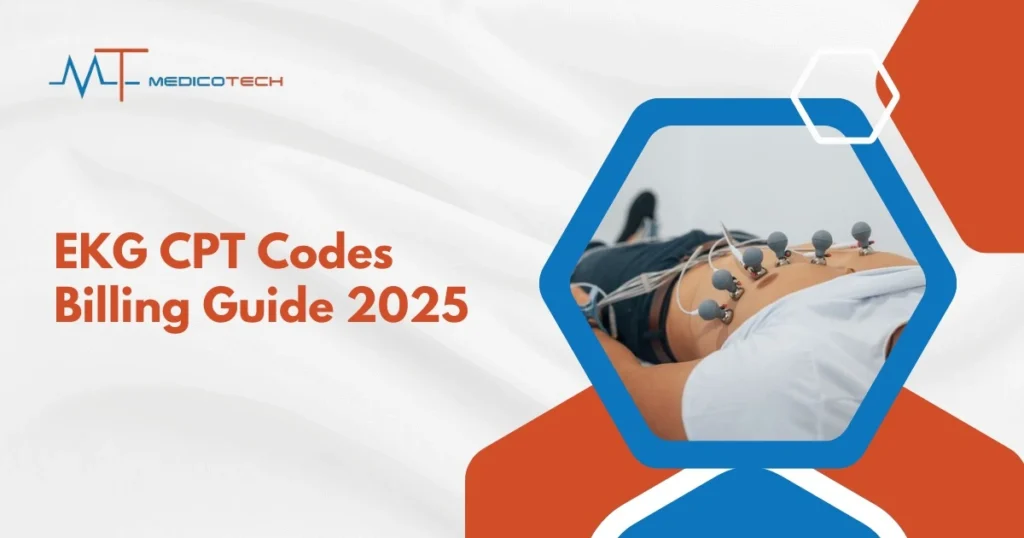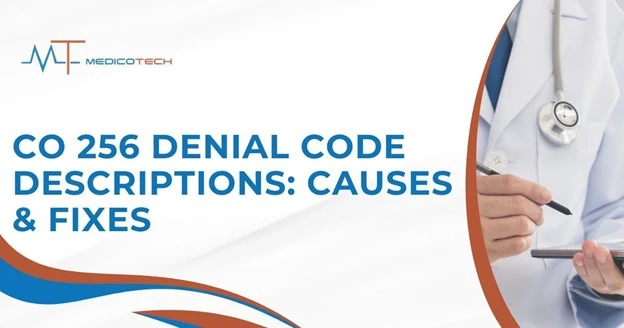In relation to medical billing, the usage of CPT codes is essential so that the right reimbursement can be stated and documented. In the case of the electrocardiograms (EKGs), you should have clear information about the particular codes and how they are applied to prevent any mistakes, which are very expensive, and to receive the reimbursement smoothly.
What is an Electrocardiogram (EKG)?
An electrocardiogram (EKG or ECG) is a painless test that takes a record of electrical activity in the heart. It assists a healthcare professional in diagnosing different abnormalities on the heart located in the likes of arrhythmias, heart attacks as well as other cardiovascular ailments. EKGs tend to be fast, only taking up a few minutes to complete and offer invaluable information about the heart health of the patient.
Why is Accurate Billing Essential?
EKG billing is often complicated, because there are numerous CPT codes, which can be used to describe separate stages of an exam. Proper selection of the correct code is crucial in the process of ensuring that the healthcare providers are accurately reimbursed by the insurance firms i.e. Medicare and Medicaid. The wrong coding may cause rejection of claims, payment delays, or underpayment of the services performed. It is therefore important that coders learn more and apply the appropriate CPT code so as to streamline their revenue cycle in the practice.
Common EKG CPT Codes
CPT codes relating to EKG exist in several numbers that relate to various dynamics of EKG. Below are some of the most common used codes:\u0049dena vertical bar
- CPT Code 93000; Electrocardiogram, standard ECG with at least 12 leads; including interpretation and report.
This is the most utilized 12-lead EKG code when performed on a regular basis. It covers both technical (test element), as well as professional (interpretation and report of a care provider).
- Cap Potted, 93005 Electrocardiogram, routine (with at least 12 leads) ECG; with tracing only, no interpretation and report.
This code applies where a healthcare provider or physician only takes the recording of EKG but the subsequent interpretation and reporting of the EKG recording is not done.
- CPT Code 93010: Electrocardiography, regular ECG at least 12 leads; interpretation/report.
This code is applied in the cases when the EKG has been already registered but the physician is involved in only interpretation and report.
- CPT Code 93040; Rhythm ECG, 1-3 leads; including interpretation and report.
This code is utilized in monitoring rhythms on 1-3 leads frequently where a more basic EKG is utilized, frequently to monitor one particular rhythm such as an arrhythmia.
In the following section, we shall explore further these codes, its specific use, and the correct billing practices over EKG services.
In the above section, we presented the facts of EKG CPT codes and their significance in proper medical billing. In this section we will explore more about how reimbursement is done, some of the challenges facing most clinics and how to code EKG procedures accurately to be reimbursed in a timely fashion.
Understanding EKG Reimbursement
Proper reimbursement of the EKG procedures is determined by a number of factors that include the CPT code charge, the insurance company, and the documentation of the medical necessity. Insurance companies including Medicare and non-Medicare also use the details provided by this CPT code and diagnosis codes to reimburse money.
Medicare and EKG Reimbursement
Medicare generally will cover standard EKGs (CPT code 93000) where the patient is considered medically necessary. Nevertheless, one should keep in mind that Medicare also has its regulations, and, in the case under consideration, only a single “Welcome to Medicare” EKG is covered at the initial visit, and only when it is ordered due to legitimate medical causes. The reimbursement rates may differ with respect to areas and the rules of the particular Medicare contractor.
Private Insurance and EKG Reimbursement
In the case of the private health insurance companies, the reimbursement may vary, depending on the basis of coverage of the policy and the extent of the procedure. When it comes to the particularities of various EKG codes (e.g., CPT 93005 and 93010), providers are expected to know the reimbursement regulations of various insurance agencies.
Key Factors Affecting EKG Billing and Reimbursement
- Documentation
- Accurate documentation is required in order to justify medical necessity, and substantiate the CPT code being used. A list of any pre-existing conditions, knowledgeable reason by physician, and symptoms in patients should be included.
- Make sure that all supportive code ICD-10 with the selected CPT code should be consistent.
- Modifiers
- In some cases, modifiers ( similar as modifier-25) may be necessary to indicate that a separate and distinct procedure was performed on the same day. This is especially applicable when EKG procedures are done in combination with other treatments or individual tests.
- Timing of the EKG
- Still, some insurers may not cover the procedure, If an EKG is performed during a routine check- up or webbing without clear symptoms or threat factors. Proper attestation of symptoms like casket pain, pulsations, or briefness of breath is essential to justify the test.
Challenges in EKG Billing and Reimbursement
- Complex Billing for Multiple EKG Procedures
- When a case requires multiple EKGs or different factors( e.g., EKG dogging, interpretation), directly rendering and billing each part can become complicated. It’s pivotal to follow the correct coding structure to avoid claim denials.
- EKG Modifiers and Multiple Services
- Occasionally, multiple services are handled, similar as both an EKG dogging and interpretation by different healthcare providers. In similar cases, applying modifiers( e.g., modifier-59 for distinct procedural services) is necessary to separate the factors and ensure proper payment.
- Occasionally, multiple services are handled, similar as both an EKG dogging and interpretation by different healthcare providers. In similar cases, applying modifiers( e.g., modifier-59 for distinct procedural services) is necessary to separate the factors and ensure proper payment.
- Documentation Issues
- Deficient or vague attestation can lead to claim denials or reduced payment. It’s essential that every step of the procedure, from patient history and symptoms to the final interpretation, is duly recorded.
Tips for Accurate EKG Billing and Coding
- Stay Updated with CPT Code Changes
- CPT canons are streamlined regularly. Healthcare providers must keep up to date with the changes in rendering to ensure that claims are submitted using the correct canons.
- Ensure Accurate Diagnosis Coding
- Elect the correct ICD- 10 canons to match the symptoms or conditions that justify the EKG procedure. Accurate opinion canons are critical for supporting medical necessity.
- Use Appropriate CPT Codes for Separate Components
- Still, ensure you use CPT canons similar as 93005 for the dogging and 93010 for interpretation and reporting, If the EKG test and interpretation are performed by different providers or on different dates.
- Still, ensure you use CPT canons similar as 93005 for the dogging and 93010 for interpretation and reporting, If the EKG test and interpretation are performed by different providers or on different dates.
- Maintain Detailed Documentation
- Easily document every element of the EKG procedure, including symptoms, test details, results, and interpretation. This will help insure the delicacy of the billing and support the medical necessity of the test.
How EKG Billing Services Can Help
Due to the complexity of EKG billing, numerous healthcare providers choose to outsource this task to technical Medical billing services. These services can help ensure accurate coding, timely submission of claims, and thorough follow- up on any outstanding payments. By working with billing experts, providers can
- Maximize payment by icing correct and comprehensive billing practices.
- Reduce claim denials by icing all attestation is complete and accurate.
- Save time and coffers that would else be spent on navigating complex billing procedures.
Final Thoughts on EKG CPT Codes and Billing
Accurate EKG rendering and billing are pivotal to maintaining a smooth profit cycle and icing timely payment for services rendered. By understanding the colorful CPT canons, staying informed about insurance programs, and keeping over- to- date with the rearmost billing practices, healthcare providers can ameliorate both the fiscal and functional effectiveness of their practices.
Flash back, when in mistrustfulness, consulting with educated billing professionals or exercising EKG billing services can help streamline the process and avoid expensive crimes.
By enforcing these tips and strategies, healthcare providers can minimize the threat of billing crimes, reduce claim denials, and insure they’re refunded fairly for their services.
Frequently Asked Questions (FAQs) on EKG CPT Codes and Billing
- What are the main CPT codes used for EKG procedures?
The most commonly used CPT codes for EKG procedures are:
- 93000: Routine ECG with at least 12 leads, including interpretation and report.
- 93005: ECG tracing only (without interpretation or report).
- 93010: ECG interpretation and report only.
- 93040: Rhythm ECG with 1-3 leads, including interpretation and report.
- 93041: Rhythm ECG with 1-3 leads, tracing only (without interpretation or report).
- 93042: Rhythm ECG with 1-3 leads, interpretation and report only.
- Why is an EKG performed?
An EKG is performed to assess the electrical exertion of the heart, diagnose implicit heart conditions, examiner treatment effectiveness, and estimate the overall function of the heart. It can help describe arrhythmias, heart complaints, myocardial infarctions( heart attacks), and ischemia. - What is the cost of an EKG procedure?
The cost of an EKG can range from$ 500 to$ 1,000, depending on factors similar as position, healthcare provider, and insurance content. For uninsured cases, the price can range from$ 500 to$ 3,000. Costs generally include both the test itself and the interpretation of the results. - How does Medicare cover EKG procedures?
Medicare covers EKGs that are supposedly medically necessary. Coverage may vary depending on the specific Medicare plan and whether the procedure is part of the original” Drink to Medicare” visit or ordered due to symptoms or a known heart condition. Always insure proper attestation of the medical necessity to avoid claim denials. - What are the challenges in EKG billing and reimbursement?
Some common challenges include:
- Complex billing for multiple components of EKG procedures (tracing, interpretation, etc.).
- Using the wrong CPT code for different aspects of the procedure.
- Inadequate documentation, which can lead to claim denials or reduced reimbursement.
- Navigating different payer policies, which may have varying reimbursement rates and requirements.




